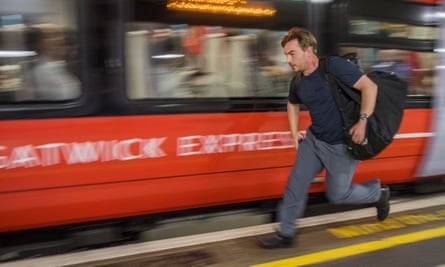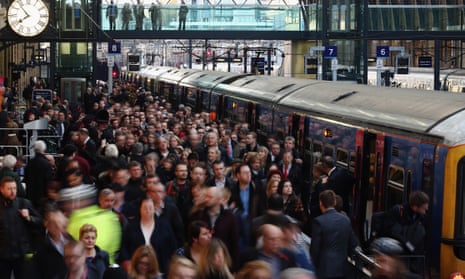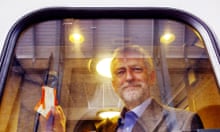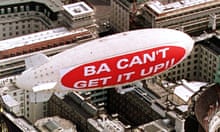Some will accuse this column of shamelessly using an embarrassing story involving the Labour leader to further my political cause. They will be right. If you want to find outrage over how many empty seats there were on the 11am train to Newcastle on 11 August, most of the media is there to cater for you. If you are among the 58% of the population who want to renationalise the railways and other utilities, you are going to struggle – to put it mildly – to find your views reflected in the media. Consider this a modest attempt to redress the balance.
Here begins the shameless shoehorning. If you believe in free market dogma – that private ownership inevitably brings more efficiency, better quality and cheaper services – then there are two major embarrassments in Britain: the NHS and the rail industry.
The NHS is embarrassing because it is a publicly run healthcare system that is superior to and more efficient than the privately run, fragmented mess that is the US equivalent. And it is loved for it. Its continued existence – though badly undermined by creeping privatisation – is a reminder of how public ownership can be vastly superior to the private sector.
The rail industry is an embarrassment because it can demonstrate just how atrocious services run for profit can be. The desire for the railways to return to public ownership – a wish felt by millions of Conservative voters – is not born of mass false consciousness, of a failure to understand that privatisation has been a glorious success. It is a product of the lived experience of Britain’s frustrated, ripped-off commuters. Richard Branson may have succeeded in causing Jeremy Corbyn embarrassment. But if Branson believes that the British public has any affection or trust in his rail services, he will be disappointed.
Much of my life is spent in train carriages, crisscrossing the country. Shelling out for an extortionate ticket in exchange for an uncomfortably overcrowded train is a bitterly familiar experience. Here’s a pro tip: if there isn’t a seat, space often can be found in the floor area next to a toilet.
On the many morning train services going into London, one in three passengers must stand because of lack of space. The evidence shows that overcrowding is getting worse on British trains. Then there’s the cost. If you live in London and urgently needed to make it to Leeds today, you would have to part with at least £98.70. A British Airways flight to Paris booked today, on the other hand, will leave you £62 worse off. The cheapest train to Edinburgh today costs £128.20. There are cheaper flights available to Madrid (£88), Berlin (£90) and Rome (£112). The proportion of British commuters’ pay packets spent on train tickets is up to is six times higher than their European equivalents.

As a 2013 report found, the state shells out billions more on public subsidies for railways than it did in the days of British Rail. And after inflation, overall public spending on the railways was an astonishing six times higher in 2013 than after privatisation in 1996.
Ah, say the train companies: if our service is so bad, why has there been such a dramatic explosion in the number of rail passengers over the years? The fact that more people have to travel longer distances for work or study because of changes in the nature of our economy is no endorsement of the national embarrassment that is our rail system. Indeed, if you’re wondering why you’re sitting next to a toilet after spending £98.70, look no further than the rail system’s failure to adequately replace rolling stock.
Rather than investing properly in their own infrastructure, companies would prefer to turn public subsidies and rip-off fares into dividends for their shareholders. It is the state that has had to step in to upgrade and improve Britain’s rail infrastructure and technology. As so often under modern British capitalism, the taxpayer carries the risk and the companies enjoy the profit.
We don’t need to speculate about whether public ownership could be a more effective way to organise our rail industry. We can just look to existing examples. There are publicly run systems across Europe that are cheaper, more efficient and of a better quality. In our own country, the East Coast franchise was brought under public ownership in 2009. It was profitable, bringing hundreds of millions of pounds to the Treasury. It needed less public subsidies than any other rail franchise. It enjoyed the best public satisfaction of any long-distance rail franchise. We can’t be having a shining beacon of public sector success, though, and so the government privatised it last year.
Its new owners – Richard Branson among them – celebrated by removing many of its cheapest advance fares, meaning de facto fare increases of up to 100%.
For the ideologues who want to roll back the state in favour of profiteering companies, the failure of privately run rail is an awkward reality. There are many others. We live in a country still reeling from the consequences of the greed of an unregulated financial sector. Even Philip Hammond – now Theresa May’s chancellor – once noted that the failure of G4S to provide sufficient Olympic security guards (the state, predictably, had to step in) shook his devotion to the private sector.
The case for publicly run rail is popular, and for good reason. It would cost nothing to bring rail franchises into public ownership as they expire, and they could prove to be cash cows for the Treasury.
And you don’t have to be a devout leftie: there are Tory-supporting middle-class professionals in London’s commuter belt who are exasperated with a failed privately run model. The views of the Conservative party and Conservative voters frequently diverge. A clever political strategy would be to exploit these tensions.
It doesn’t mean returning to the days of British Rail, either. This time around, we could have a democratically run rail system, with franchises partly run by representatives of passengers and workers. The high priests of the “private sector is always best” religion would rather we shut up about the train wreck of rail privatisation. But it demonstrates how wrong they are. And we should never let them forget it.









